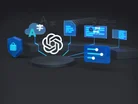OpenAI Poised to Announce Google Search Competitor

The offering is reportedly an AI-powered search product designed to directly compete with Google's long-standing dominance in the field.
The AI research lab, famous for its ChatGPT offering, has previously been dubbed ‘The search engine killer’ for its system’s ability to get tailored content to users prompts in seconds.
Chatbot competition
Traditional search engines rely on keyword matching and relevance algorithms, which can often return overwhelming results or fail to grasp the user's true intent.
Chatbots, like OpenAI, uses cutting-edge AI models to generate human-like responses to text prompts.
Although details are sparse on what exactly will be unveiled, Bloomberg report OpenAI's search product is to be an extension of its flagship ChatGPT product, and could enable it to pull in direct information from the web and include citation.
The announcement is poised to come a day before the the start of Google's annual I/O conference, where the tech giant is expected to unveil a slew of AI-related products.
We’ll be streaming live on https://t.co/OcO6MLUYGH at 10AM PT Monday, May 13 to demo some ChatGPT and GPT-4 updates.
— OpenAI (@OpenAI) May 10, 2024
Search engines v chatbots
OpenAI's announcement is part of a broader shift now seen by these chatbots to take on traditional search engines with their offering.
Perplexity, a startup founded by a former OpenAI researcher that has raised upwards of US$100m, is building an "AI-native" search experience that goes beyond text results, incorporating images, citations, and a user-friendly interface specifically designed for AI.
AI and machine vision advances have meant that visual searches are already being conducted billions of times a month, and it is believed it will become an increasingly attractive way for users to search for information.
Google has also been experimenting with visual searches through its Lens tool, recently unveiling a AI-powered ‘multisearch’ functionality, which combines text and visual search capabilities through its Lens tool.
The explosion of AI chatbots through the likes of ChatGPT had industry rushing to incorporate, invest in, or compete with GenAI companies and functionalities.
Microsoft announced a US$10bn investment in OpenAI, alongside incorporating its own AI Chatbot into the Bing search engine, and is tipped to release its largest language model yet, the MAI-1.
Elon Musk last year unveiled AI chatbot Grok under his AI company xAI.
Google, meanwhile, committed US$2bn in OpenAI competitor Anthropic, drawing a line in the sand in the AI race.
Google had also created its own chatbot, Bard, yet after a false start where the chatbot was shown to yield unimpressive responses in some instances, and factually inaccurate in others, has since been rebranded to Gemini.
Ensuring AI accuracy
In 2023, ChatGPT managed to secure the largest share of AI tool use, equating to over 60% of traffic.
Most AI chatbots have since been updated to compete in terms of offering, with Gemini, Bing and many others including some form of internet searching.
Yet, the accuracy of which, alongside the consistency, remains dubious.
ChatGPT’s LLM has previously been known to fabricate entire studies or quotes as part of its generations. Therefore, accuracy is likely to be stressed as part of this announcement.
******
Make sure you check out the latest edition of AI Magazine and also sign up to our global conference series - Tech & AI LIVE 2024
******
AI Magazine is a BizClik brand
